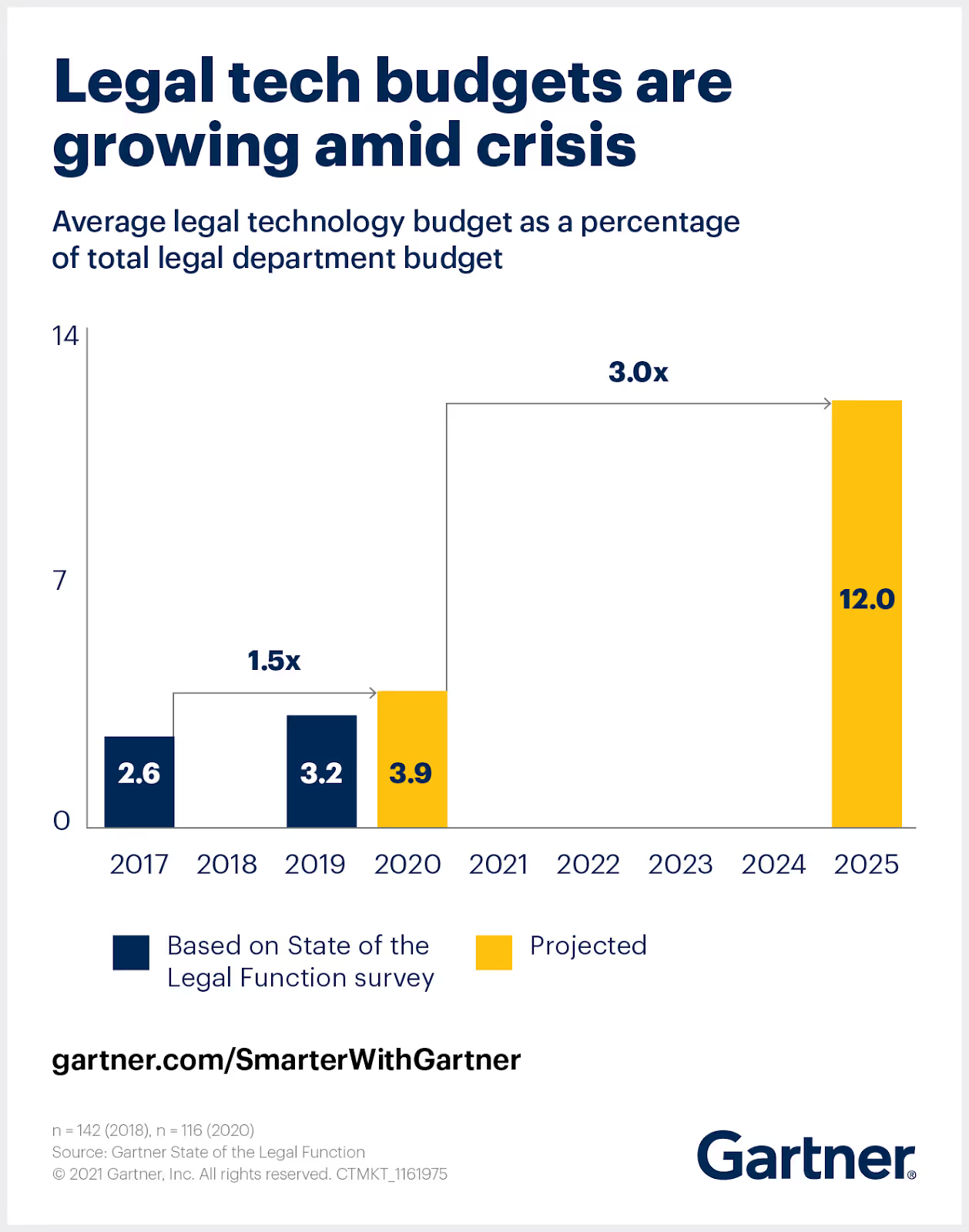In this blog post, we’ll explore 4 legal technology trends to show leaders where to capitalize on legal tech investments, to optimize performance and drive business outcomes.
Legal departments have a history of resistance to automation, but the impact of the pandemic has forced many legal teams to pursue - or at least consider - different forms of legal technology to optimize business outcomes while working remotely. Technology is the most obvious solution for many departments, but the challenge now is to sort through the noise to decide which technologies will prove successful.
“The pressure that the COVID-19 pandemic put on legal departments has certainly been a catalyst for this change,” says Terry Falk, Athennian. “Lawyers are not known for being the first to modernize, but right now, there are limited options. The pandemic has decreased staffing budgets and increased workloads, making legal technology adoption the most obvious choice.”
Trend #1: By 2024, legal departments will have automated 50% of legal work related to major corporate transactions.
The COVID-19 pandemic has increased workloads while simultaneously decreasing staffing budgets. An M&A backlog will still exist as companies recover, and hoping to hire talent to support this is currently not an option for most departments.
Despite the hype surrounding the “automation” buzzword, it’s not a leap of faith. According to a 2019 Gartner survey, legal departments reported that 55% of their corporate transaction work could be automated, and a third of it (33%) already was.
The key to success is to first identify specific bottlenecks that exist within your workflows, and onboard legal tech to solve those issues with automation rather than deploying the technology first.
Trend #2: By 2025, legal departments will increase their technology budgets by 300%.
Productivity demands have significantly increased due to the pandemic. Legal departments are already thinly stretched, and therefore will be increasing their technology budgets drastically by 2025 in order to automate manual processes that take up time. [2020 Digital Leader Survey].

Leaders in the legal industry are seeing other departments find success with technology investments. Significant advancements in legal tech such as cloud-based entity management has also been driving this change.
Previously, in-house legal departments relied heavily on external law firms to manage their corporate governance. However, advancements in technology have opened the door to a more cost-effective, longer-term solution: bringing the work in-house with the support of modern entity management platforms.
Trend #3: In 2021, there will be a shifting focus to optimize Legal Operations Management.
As noted above, legal departments are much more empowered and prepared to manage corporate governance in house due to advancements in legal tech. Prior to the COVID-19 pandemic, many in-house teams were trying to manage operations with outdated and ineffective tools such as Excel Spreadsheets and email. Important and sensitive data was being managed with little to no collaboration or sharing abilities, no automation, and no dynamic reporting.
Legal documents were being stored in tools such as Dropbox, Sharepoint and Google Drive, increasing risk and making collaboration almost non-existent.
For these reasons, in-house legal teams have started and will continue to consolidate and optimize their daily work in a central hub that improves efficiency and automates workflows with modern features such as eSignature, virtual minute books, and task management. By 2025, legal departments will have identified and harnessed the power of technology to streamline their operations management.
Trend #4: Introducing the strategic priority of identifying and mitigating risk at the outset.
Due to the increasing complexity of compliance and risk mitigation, security and risk management is not something that can be considered after the fact.
According to a 2020 Gartner Legal & Compliance Agenda Survey, 44% of respondents reported that proactively addressing risks is a top concern. The survey also reported that most general counsel and legal leaders are struggling to provide fast and efficient service to clients in a “new risk environment, characterized by hybrid operations, remote workforce and emerging uncertainty.”
The exponentially changing landscape of the legal industry requires in-house teams to explore concerns rapidly, prioritize work using improved decision making tools, and adapt dynamic skill building with a focus on efficiency and automation.
Final thoughts
The journey to best-in-class is ongoing - there are always opportunities to improve. If you’ve already utilized best practices and actively considered how legal technology may impact your roadmap, then you’re already ahead of the game.
At Athennian, we’re happy to help accelerate the initiatives that you may already be pursuing or supplement your current strategic thinking when it comes to digital legal entity management. Let us show you why Athennian’s cloud-based entity management platform is the first choice for in-house legal departments. Book a 30 minute discovery call with our experts.




.svg)


.avif)
.avif)
.avif)



-p-500.webp)
-p-500.webp)
-p-500.webp)
.webp)
